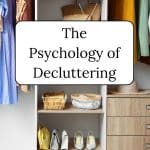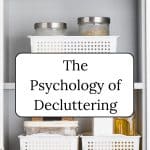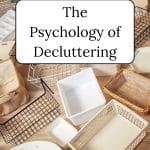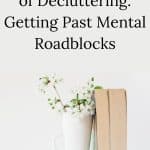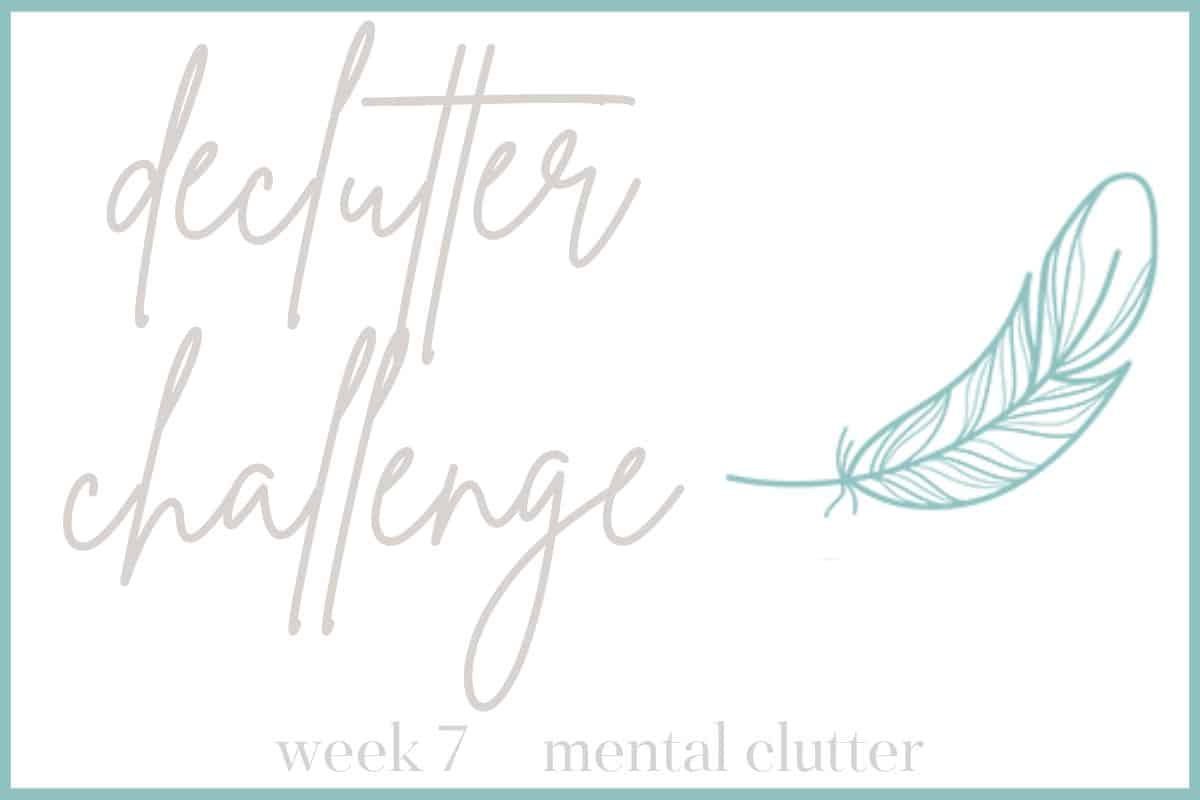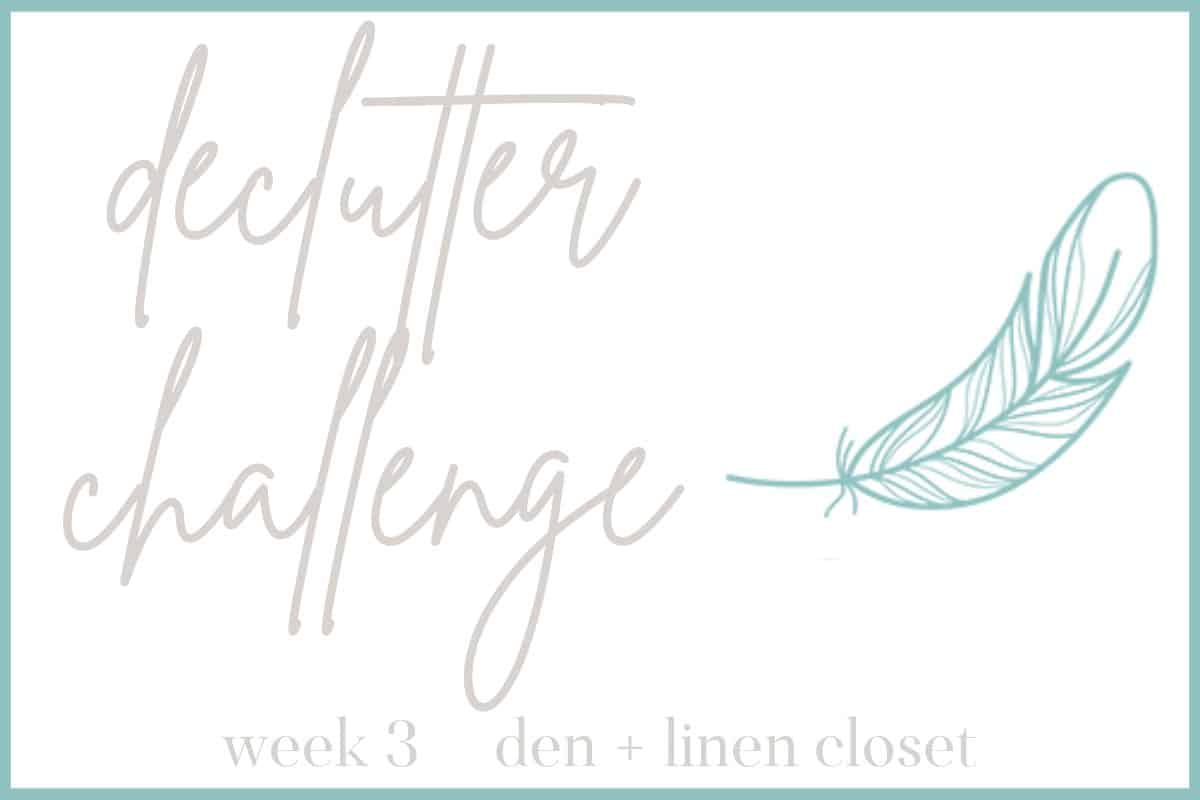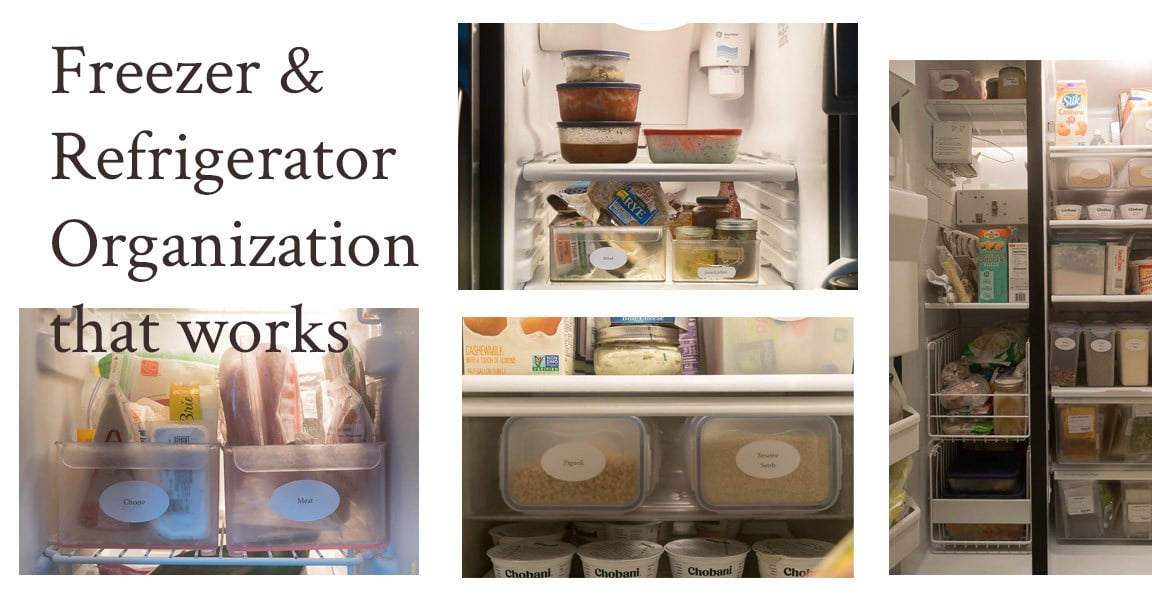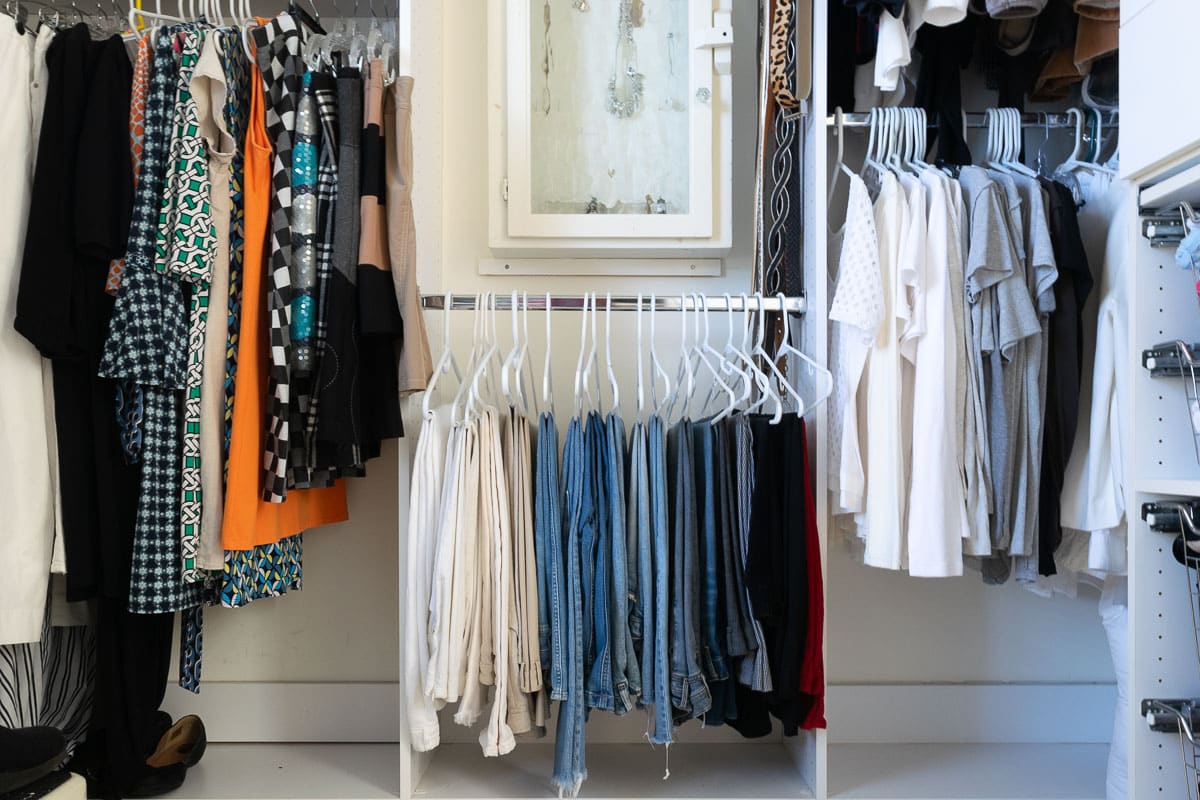The Psychology Of Decluttering: Getting Past Mental Roadblocks
This article about The Psychology of Decluttering takes a closer look at clutter’s implications on your mental health and actionable strategies to incorporate effective organization processes into your schedule.
Almost every home has clutter in closets, bedrooms, or attics. It can even overtake other areas in extreme cases. Even if it’s not visible, having excess stuff affects your mental health, leading to stress and loss of focus.
The western, first-world lifestyle is such that decluttering is a constant process; it’s not a one-and-done. We bring things in (food containers, mail, clothing, documents, cleaning products, decor, etc…) but rarely take out as much as we bring in. At the start of each year, I go through each room, looking to declutter it. You can join the Declutter Challenge anytime here! You’ll receive weekly checklists targeted at specific rooms that help you identify items that commonly clutter those rooms and tips to help you declutter successfully!
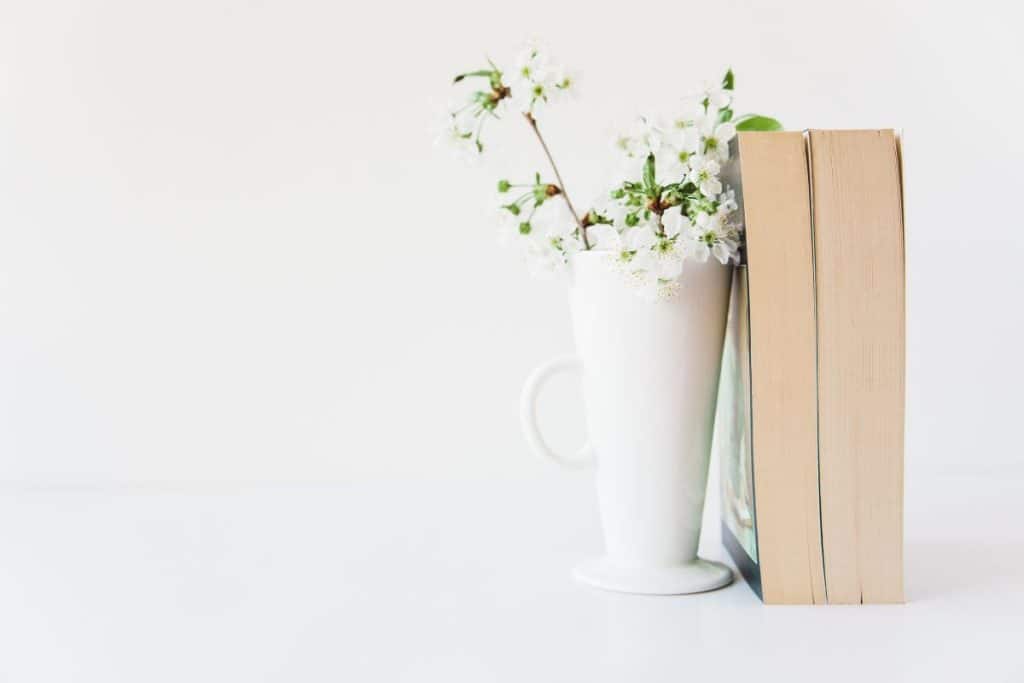
Table of Contents
The Psychology of Decluttering: Why You Have Clutter
Part of discovering the psychology of decluttering is figuring out the WHY! You have disorganized mail, papers, and clothing for many reasons, such as the following:
1. You’re Unable to Identify What is Clutter
Sometimes, you struggle with knowing what’s clutter and what isn’t. For instance, a pile of magazines can be valuable but has not been helpful for the past few years. Perhaps you’re still holding onto something that was once useful, hoping you’ll need it in the future, like your college papers. Struggling with these thoughts might be why you find it hard to organize your home.
2. You Hoard
Hoarding is associated with acquiring unmanageable amounts of items that have limited value or are useless. It can be a disorder that causes significant problems if the amount of clutter interferes with daily living. For instance, you can’t navigate your room properly because of the accumulated items on the floor.
It’s estimated that around 2%-6% of the population suffer from a hoarding disorder, affecting men and women at similar rates. If you usually buy useless items because of an impulse or a deal that’s too good to pass up, you might be stuck in the cycle of stockpiling too much stuff at home.
3. You Don’t Know How to Let Go
Photos, letters, notes, and other sentimental items are more challenging to let go of. However, it’s crucial to the decluttering process because it makes room for new items. It’s acceptable to feel emotional while parting with them, but there are ways to ease the process, such as taking it slowly or passing items down to loved ones.

4. You Don’t Take Inventory of Your Items
When you periodically take inventory of your items, you help maintain space at home. Over time, your interests, tastes, and needs will change. Assessing what you have stored in your attic or cabinets can help you see and dispose of forgotten items.
5. You Put Cleaning Off
You’re aware of the clutter but stuck in a hectic schedule that pushes house cleaning off your to-do list. When this happens every week, it may result in clutter. One way to help overcome this habit is to finish a project you started. For example, if you’ve decided to sort your books and donate some today, take them immediately to a donation center.
Something I’ve found helpful is a BUY NOTHING Facebook group. Many cities and towns have them. The beauty of this group is that you can put the stuff you are discarding in your driveway or front porch, and the person who wants them comes and gets them without you having to take them. This avoids the inevitable of driving around town for a month with your discards in the trunk!
The Psychology of Decluttering: How Clutter Impacts Your Mental Health
Have you ever looked at your disorganized closet and felt unmotivated to dress for the day? It turns out that your stockpile can impact your mental well-being in many ways.
Increased Stress Levels
Physical mess leads to mental stress, especially for sensitive people. The chaos at home can overstimulate you — seeing a pile of papers on the table, and the dishes in the sink can make you stressed and anxious. With so many responsibilities, not having time for decluttering can also increase your cortisol levels. If clutter starts affecting your daily life, such as working and moving around, it can cause frustration.
Difficulty Focusing
Everywhere you turn, an item catches your attention — dirty laundry on the corner, a stack of mail on the coffee table, and plastic containers in your cupboard. Things you see every day can mess up your ability to focus.
This can be more challenging for people with attention deficit hyperactivity disorder (ADHD), who are more likely to collect clutter. About 32% of people with ADHD have significant hoarding symptoms compared to adults with obsessive-compulsive disorder (OCD).
Lower Quality of Life
The accumulation of items can lead to constant anxiety and frustration, which can impede you from performing daily tasks. Running around looking for missing items can feel like a waste of time that could have been spent doing the things you love.
Clutter can also contribute to burnout. A study found that office clutter decreased job satisfaction and increased the risk of burnout, especially among senior employees. If you struggle with clutter in your workplace, maybe it’s high time to deal with it.
The Psychology of Decluttering: Identifying Mental Roadblocks to Decluttering
Why is it easier for some people to collect nonessential stuff than deal with it? Here are some reasons why it’s so hard to declutter.
1. You’re Emotionally Attached
People are constantly bombarded with messages telling them they need more of what they already own. While object attachment isn’t necessarily an issue, it becomes a problem at extreme levels, especially when you start basing your self-worth on an object.
2. You Find Security in Owning Stuff
Decluttering becomes a challenge when you see your stuff as a security blanket. You conjure what-if scenarios, which makes it more difficult to detach. You might also force yourself to believe that you’ll need it someday soon, even though you’re unsure.
Sometimes, people hold onto things because they’re afraid they won’t be able to replace these items when needed.
3. Your Stuff Provides Comfort
The joy of owning your items provides you comfort. Whether it’s your clothes that don’t fit anymore or a collection of letters, it might be challenging to let go of things that used to bring you joy at some point in your life.
You might not realize that you can still enjoy the same joy in keeping your most valuable possessions and eliminating nonessentials.
4. Your Items Bring Memories
One of the struggles of letting go of items is because they remind you of fond memories from the past. It’s completely fine to love items reminiscent of happy memories. However, hanging on to the reminders of the past that no longer provide value can get lost among all the clutter.
The Benefits of Decluttering and Organizing
When convincing yourself to declutter becomes challenging, here are some benefits to remind you why it’s worth persevering.
Improve Your Physical Health
Tidying your home can make you feel better. Dust and clutter can trigger allergies and respiratory issues like asthma. Studies show that common organic pollutants are two to five times higher indoors than outside, regardless of whether you live in a rural or urban area.
Take Control of Your Space
Organizing your items can be a way to assert control over life, providing you with a sense of mastery over your space. Disorganization can distract you and make focusing challenging, especially when working from home.
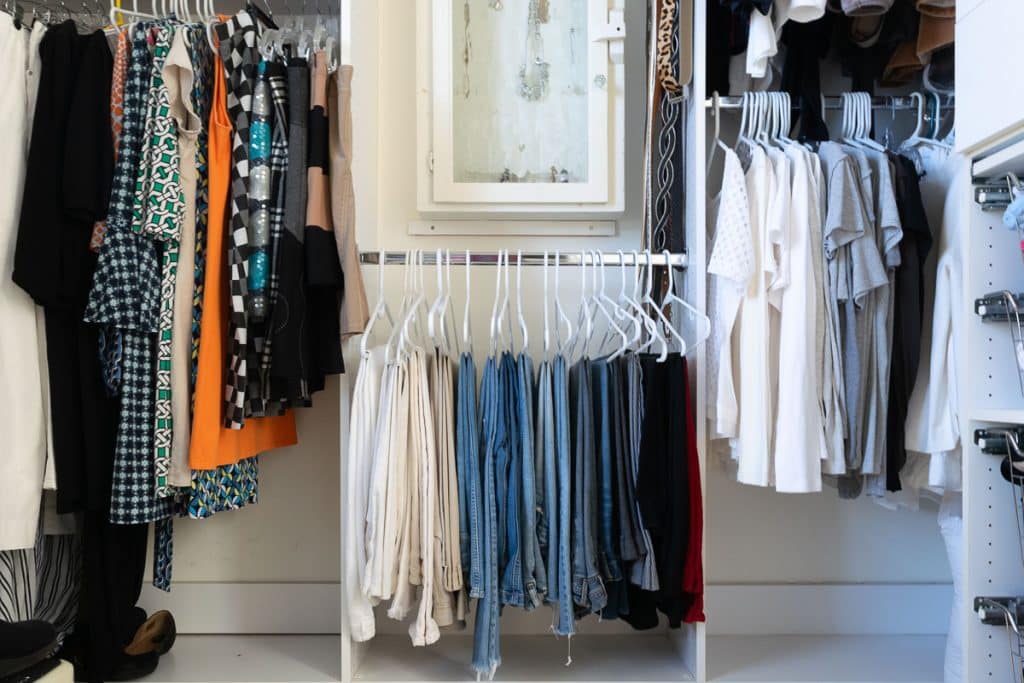
Feel Lighter
One survey found that around 63% of Americans said cleaning is a vast de-stressor. Having less stuff can help lighten your mental load and make you realize the liberating feeling of owning less. When you have minimal possessions, you can take time to enjoy the things you have. Over time, you’ll also learn to reduce unnecessary purchases and find satisfaction in your current belongings.
Improve Your Mood
Anxiety loses its grip when you become more mindful of your belongings. Washing dishes, throwing paper scraps and disposing of broken appliances can give you a sense of relief and boost your mood. Organizing can release endorphins, which act as a stress reliever, ease pain and enhance well-being.
Calm Your Mind
Cleaning brings your mind to a state of calm during overwhelming situations. Deep cleaning can be an outlet for frustration and negative emotions, shifting your focus from negativity to focusing on organizing your stuff.
How to Overcome Psychological Roadblocks
Now that you’re aware your environment is closely related to your mental health, it’s time to take action toward a cleaner home. Here are some strategies you can try today:
1. Create a Sorting System
Establishing a sorting system allows you to organize all items. One easy way to do that is to label four boxes: “store,” “donate,” “keep,” and “toss.”

As you go through each item, ask yourself these questions:
- Does it still work? Around 31% of people admit to owning at least one broken and unusable item at home. Get rid of things that are beyond repair.
- Does it spark joy? Professional organizer Marie Kondo popularized a decluttering process of removing anything that no longer brings joy.
- Does it fit? It can be challenging to let go of shoes or pants you once loved, but there’s no reason to give them space in your closet if they don’t fit anymore. This is especially true if you have too many clothes. In 2017, 16.9 million tons of textiles were produced, most ending up in landfills. Donate your old clothes and help save the environment.
2. Start Small
People usually put off cleaning, thinking the chore is too daunting. Start small instead of pushing yourself to tidy up the whole house in a day. You can start by decluttering one room or closet. Before you know it, your home will be cleaner in no time.
For example, start with sorting through your papers today. Tomorrow, get rid of clutter in the bathroom. Keep the momentum going until you finish.
Our Declutter checklists are a great tool to help you get started. They identify items common to certain areas of the home, which can most likely be discarded without you even missing them.

3. Try the KonMari Method
This decluttering process by Marie Kondo teaches you to tackle your mess category-by-category rather than cleaning per room. This method encourages you to keep things that spark joy, and it comes with categories meant to be followed in a specific order:
- Clothes
- Books
- Papers
- Komono or miscellaneous items
- Sentimental belongings
Before starting, picture your home organized and free of clutter to motivate you to stay committed to the organizing process. Afterward, review each category and consider if each item still brings you joy. Get rid of those that don’t bring value to your life anymore.
4. Motivate Yourself With a Goal
Visualize what you want to have at home. For instance, envision your family and friends coming to your place for a movie night you’ve wanted to organize, but your messy living room has stopped you from following through. Perhaps you’ve always wanted to create a home workspace, but a stockpile in another room has stopped you.
Simple goals like this can motivate you to do things you thought you were incapable of. And consider rewarding yourself! When I finally tackled my craft room, I treated myself to an over-the-door gift wrap organizer; I didn’t allow myself to put it up until after the rest of the room was organized!
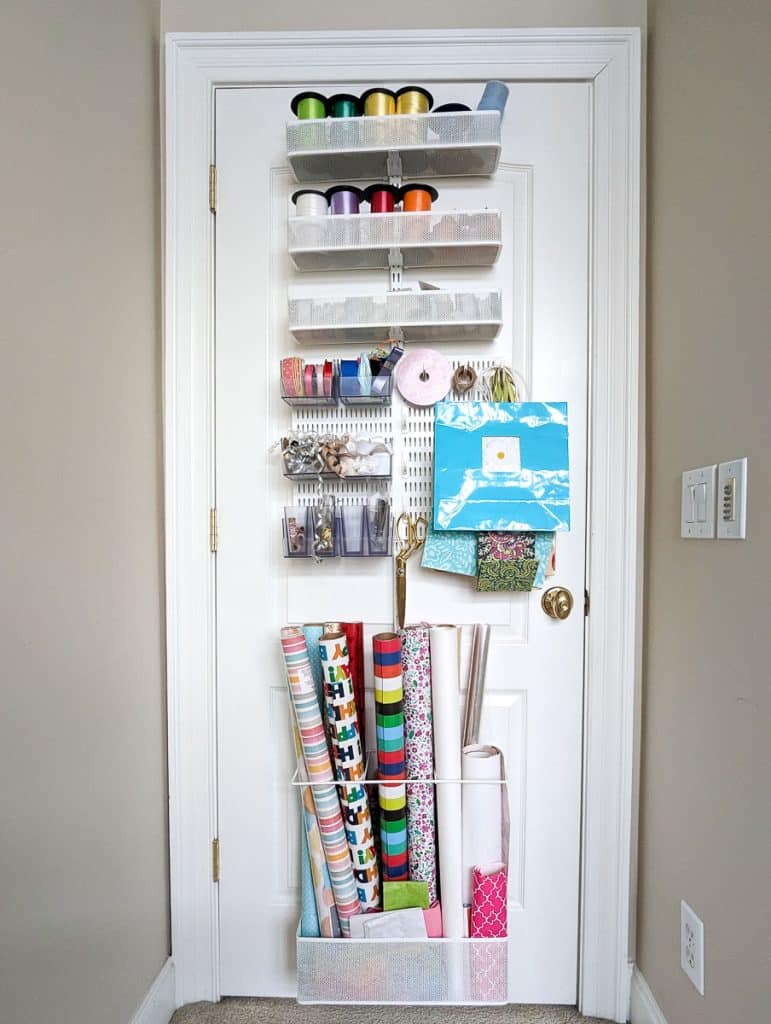
5. Seek Support and Accountability
Sometimes, the chaos is too big to tackle on your own. Maybe you’re dealing with a life transition, such as running your own business, welcoming a baby, or balancing work and school. Regardless of your situation, remember that seeking help will always remain an option for decluttering.
Asking for help may be challenging, but you’ll never know if people will help you if you don’t ask. Talk to your trusted family and friends and see if they can lend a helping hand. Having them around also allows you to finish the task on time.
I’ve spent a weekend at my sister-in-law’s and a good friend’s homes to help them start decluttering. Reach out and ask a friend!
Start Decluttering and Organizing Today
Decluttering can be enjoyable to some people, but others find it challenging for different reasons. If you feel overwhelmed by the mess you have at home, remember it’s not too late to enjoy the clean environment you deserve. Start small and do it one step at a time. And understanding the psychology of decluttering is essential! Eventually, decluttering will feel more manageable and enjoyable.
Bookmark this page or pin the following image to refer to this post on The Psychology of Decluttering in the future.
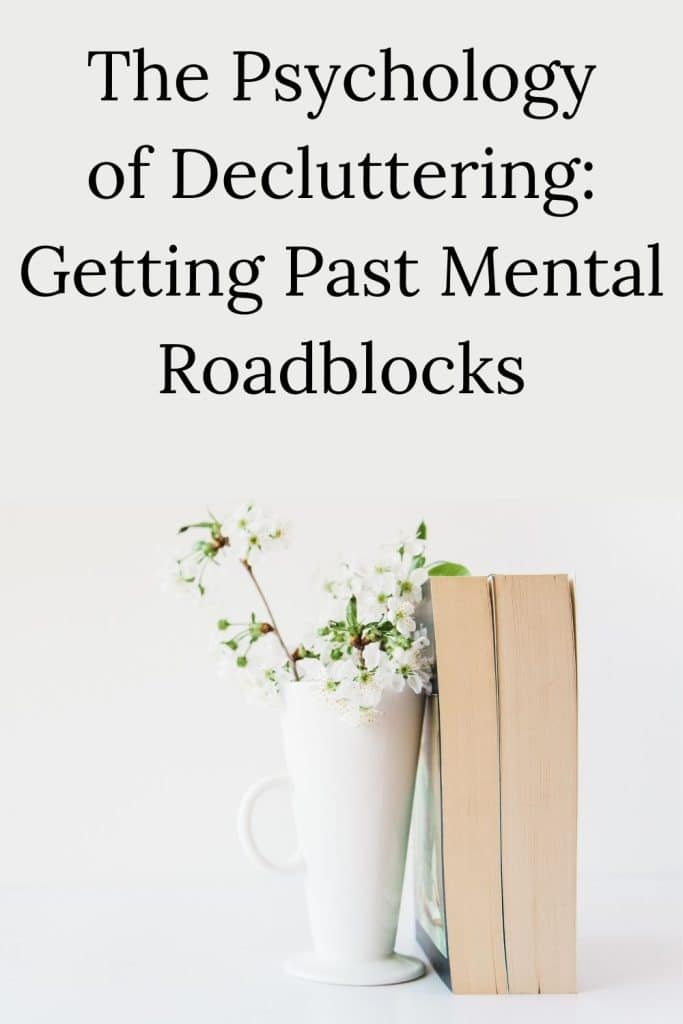
Evelyn Long is a writer passionate about helping others maintain a decluttered and manageable home amidst busy schedules and mental blocks. She is the founder of Renovated Magazine, which focuses on homeowner tips for home maintenance, cleaning, and organizing. You can find more of her work by visiting her X profile.

